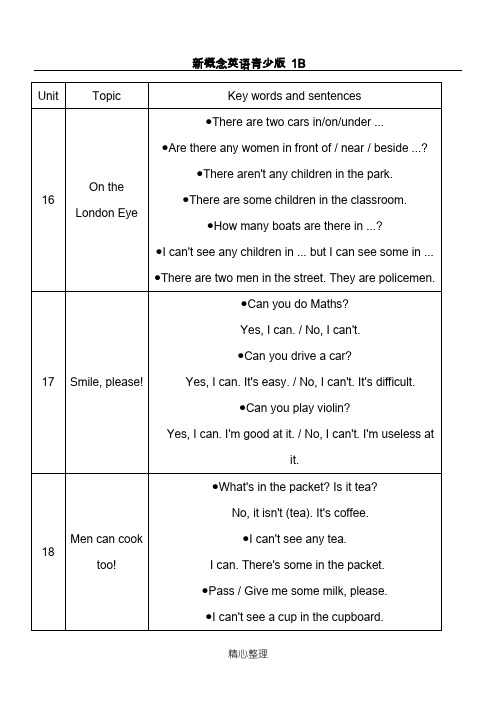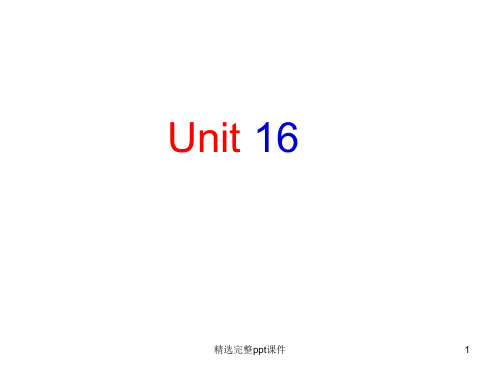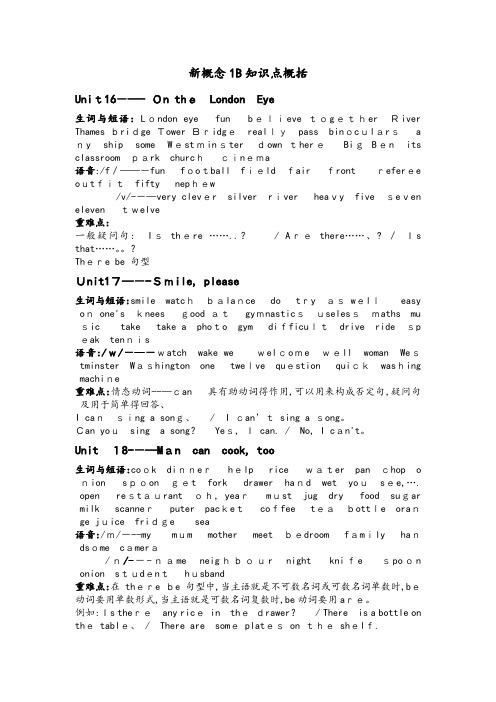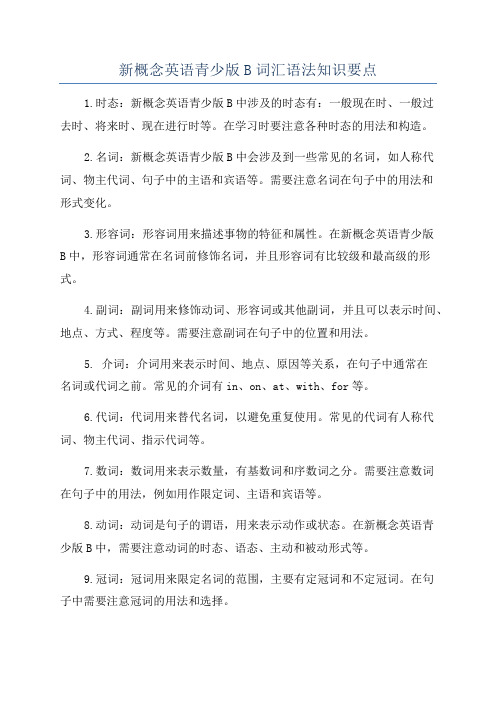新概念青少版1b知识点总结
新概念英语青少版 1B

新概念英语青少版1BUnit Topic Key words and sentences16On theLondon Eye●There are two cars in/on/under ...●Are there any women in front of / near / beside ...?●There aren't any children in the park.●There are some children in the classroom.●How many boats are there in ...?●I can't see any children in ... but I can see some in ...●There are two men in the street. They are policemen.17 Smile, please!●Can you do Maths?Yes, I can. / No, I can't.●Can you drive a car?Yes, I can. It's easy. / No, I can't. It's difficult.●Can you play violin?Yes, I can. I'm good at it. / No, I can't. I'm useless atit.18Men can cooktoo!●What's in the packet? Is it tea?No, it isn't (tea). It's coffee.●I can't see any tea.I can. There's some in the packet.●Pass / Give me some milk, please.●I can't see a cup in the cupboard.No, there isn't one.●I can't see any tea in the cupboard.No, there isn't any.19 You must eat!●There's a lot of / lots of fish ...There are a lot of / lots of peaches ...●Is there any fish ...?Yes, there is, but there isn't any meat.●Are there any peaches ...?Yes, there are, but there aren't any grapes.●Buy some bread / peaches, please.Why? There are a lot ...●Don't buy any bread / peaches.Why not? There aren't any ...●You must eat.20What asurprise!●What time is it?It's a quarter past two / half past two / a quarter tothree.●What time's / When's your English lesson?At one o'clock. / At a quarter past two. / At half past two. / At a quarter to six.●I / We must hurry.●Come on! Hurry up!21Breakfastblues●Have you got any tea?Yes, I have. / No, I haven't.●Have we got any coffee?Yes, we have. / No, we haven't.●They've got some bread, but they haven't got anycake.●How much coffee have you / we got?I / We haven't got much.●Do you want any ...?No, I don't want any ...●I don't want any ..., but I want some ...22Watching theneighbours●Paul has got a lot of friends.●They haven’t got a lot of spare time.●He can introduce her to them.●How many CDs has Paul got?23An expensivecamera●Has he / she got a British camera?Yes, he / she has. / No, he / she hasn't.●What kind of camera has he / she got?He's / She's got a Japanese one.●Claire wants a camera. She doesn't want a CD player.●He / She likes Japanese cameras.●What kind of bag do you want?I want a leather one. I like leather bags.24 A light dinner●Do you like vegetables?Yes, I do. / No, I don't.●Do you like tea?Yes, I do, but I don't want any now.●I / We / They don't like vegetables very much.●I love vegetables!I hate them!25The weekendshopping ●I want a bag of sugar / a bottle of wine / a packet oftea ...●She / He needs some sugar.●How much (sugar) does she / he need?●She / He needs one / a box of chocolates.●Irregular noun plural: a / one loaf - two loaves26A self-servicerestaurant●Has Karen got a coat / any gloves?No, she hasn't. Show her that one / those.●Show it / them / that one / those to Karen.●Give me / her / him that one / those.●Pass me / her / him that one / those.●Take her / him that one / those.●I don't want a coat / any gloves. I've already got one /some.27 Toothache●What day is it?It's Sunday.●When is / When's your appointment?It's on Sunday.●When can the dentist see you?He can see me at four o'clock on Sunday.●How does Robert feel / look?He feels awful. He looks miserable.●What's the matter with Robert?He has got / He's got toothache."28Every day isdifferent! ●What's the weather like in spring / summer / autumn /winter?●Is it ever fine and warm in spring (in England)?●It's often/usually/sometimes/always/never fine andwarm in spring.●The sun often shines. / It rains sometimes. / Itsometimes snows.●Which season do you like?I like winter.29 Many happyreturns of theday!●Which is the first / last month of the year?January / December.●Which month comes after / comes before January? -February / December.●What's the date?It's the second of February. / It's February thesecond.●When is Linda's birthday?It's in January.It's on the ninth of January / on January the ninth.●How old is Linda?She's 42. / She's 42 years old.30Aninternationalevent●Where does he / she come from?He / She comes from Australia.●Where do they / you come from?They / We / I come from China.●Where does he / she live?He / She lives in Sydney.●What language does he / she speak?He / She speaks English.Unit16:On the London Eye1:Teaching objectives复习一般现在时学习Some和any的用法2:Language focus:Fun, believe, bridge, really, pass, binoculars, any ,ship3:Teaching procedureGreeting: 介绍自己,同时要求学生做自我介绍,内容包括Name, (My name is…or I am…)Age, (I am …years old or I am a girl or a boy of …years old)Gender,Hobbies (I like doing …)等几个方面。
新概念青少版 1B 单词

精选完整ppt课件
18
its pron. 它的
精选完整ppt课件
19
Lesson 32
精选完整ppt课件
20
classroom n. 教室
精选完整ppt课件
21
park n. 公园
精选完整ppt课件
22
church n. 教堂
精选完整ppt课件
23
cinema n. 电影院
精选完整ppt课件
Unit 16
精选完整ppt课件
1
Lesson 31
精选完整ppt课件
2
London Eye n. 伦敦眼
精选完整ppt课件
3
fun adj. 有趣的
精选完整ppt课件
4
believe vt. 相信
精选完整ppt课件
5
together adv. 一起
精选完整ppt课件
6
River Thames n.泰晤士河
精选完整ppt课件
12
any 任何一个
精选完整ppt课件
13
ship n. 船
精选完整ppt课件
14
Westminster Bridge 威斯敏斯特大 桥
精选完整ppt课件
15
some adj. 一些
精选完整ppt课件
16
down there adv. 下面那里
精选完整ppt课件
17
Big Ben n. 大本钟
24
精选完整ppt课件
7
bridge n. 桥梁
精选完整ppt课件
8
Tower Bridge n. 塔桥
精选完整ppt课件
9
really adv. 真正地
青少版新概念1B(Unit16-18)

青少版新概念1B(Unit16-18)Unit 16:Part A:在这个部分中,学习者将学习到两种不同的特殊疑问句,即“什么”的疑问和“哪个”的疑问。
通过这些问题,他们将了解如何询问物品的名称以及事物的身份。
这个部分还包括一些新的单词和短语,如“headphones(耳机)”、“would like (想要)”和“birthday(生日)”。
通过学习这些单词和短语,学习者将改善他们的词汇量,并学会在特定情况下使用它们。
Part B:在这个部分中,重点是学习过去式的使用方法。
学习者将学习如何使用一些基本的过去时态动词,如“went(去)”和“saw(看到)”,在过去的时间内描述自己的经历。
这个部分还包括一些新的单词和短语,如“the science museum(科学博物馆)”、“last(最后)”和“yesterday(昨天)”。
通过学习这些单词和短语,学习者将能够扩大他们的词汇量,并在描述自己过去的经历时,准确地使用这些单词。
Unit 17:Part A:在这个部分中,学习者将学习如何表达个人需要和偏好的说法,即“我喜欢(I like)”和“我需要(I need)”。
通过这些句式,学习者将能够更好地了解自己的要求和兴趣,并用英文表达出来。
这个部分还包括一些新的单词和短语,如“pencil case(铅笔盒)”、“maths(数学)”和“history(历史)”。
通过学习这些单词和短语,学习者将改善他们的词汇量,并在描述自己的需求时准确地使用这些单词。
Part B:在这个部分中,学习者将学习如何描述外貌和特征。
他们将学习使用形容词来描述外貌,如“苗条的(slim)”、“高的(tall)”和“耳朵大的(big-eared)”。
这些形容词将帮助学习者了解如何用英语描述人物特征。
这个部分还包括一些新的单词和短语,如“curly(卷发的)”、“kind(善良的)”和“unkind(不好的)”。
通过学习这些单词和短语,学习者将能够扩大他们的词汇量,并在描述人物特征时,准确地使用这些单词。
青少版新概念1B知识点

新概念1B知识点概括Unit16-—- On theLondon Eye生词与短语: London eye fun believe together River Thames bridge Tower Bridge really pass binoculars a ny ship some Westminster down there Big Ben its classroom park churchcinema语音:/f/——-fun football field fair front referee outfit fifty nephew/v/--—very clever silver river heavy five seven eleven twelve重难点:一般疑问句: Is there ……..? / Are there……、? /Is that……。
?There be 句型Unit17—--Smile, please生词与短语:smile watchbalance do try as welleasy on one's knees good at gymnasticsuselessmaths mu sic take take a photo gym difficult drive ride sp eak tennis语音:/w/-—-watch wake we welcome well woman Westminster Washington one twelve question quick washing machine重难点:情态动词--—can 具有助动词得作用,可以用来构成否定句,疑问句及用于简单得回答、I cansing a song、 / I can’t sing a song。
Can yousing a song? Yes, I can. / No, I can't。
新概念英语青少版B词汇语法知识要点

新概念英语青少版B词汇语法知识要点1.时态:新概念英语青少版B中涉及的时态有:一般现在时、一般过去时、将来时、现在进行时等。
在学习时要注意各种时态的用法和构造。
2.名词:新概念英语青少版B中会涉及到一些常见的名词,如人称代词、物主代词、句子中的主语和宾语等。
需要注意名词在句子中的用法和形式变化。
3.形容词:形容词用来描述事物的特征和属性。
在新概念英语青少版B中,形容词通常在名词前修饰名词,并且形容词有比较级和最高级的形式。
4.副词:副词用来修饰动词、形容词或其他副词,并且可以表示时间、地点、方式、程度等。
需要注意副词在句子中的位置和用法。
5. 介词:介词用来表示时间、地点、原因等关系,在句子中通常在名词或代词之前。
常见的介词有in、on、at、with、for等。
6.代词:代词用来替代名词,以避免重复使用。
常见的代词有人称代词、物主代词、指示代词等。
7.数词:数词用来表示数量,有基数词和序数词之分。
需要注意数词在句子中的用法,例如用作限定词、主语和宾语等。
8.动词:动词是句子的谓语,用来表示动作或状态。
在新概念英语青少版B中,需要注意动词的时态、语态、主动和被动形式等。
9.冠词:冠词用来限定名词的范围,主要有定冠词和不定冠词。
在句子中需要注意冠词的用法和选择。
10.句型:新概念英语青少版B中会涉及一些常见的句型,如陈述句、疑问句、否定句等。
需要掌握这些句型的构造和用法,以便正确表达自己的意思。
以上是新概念英语青少版B词汇语法知识的要点,学习时可以结合课本和练习题进行复习和巩固。
青少版新概念1B_unit20

干燥的
get
拿来,得到 food
食物
fork
叉子
sugar
食糖
drawer 抽屉
milk
牛奶
Lesson 36
scanner 扫描仪
computer 电脑
packet
小包
coffee 咖啡
tea
茶叶
bottle 瓶子
orange juice 橙汁
fridge
冰箱
sea
海
Lesson 37
eat
吃
Lucy: Mum! I must find my book!
Karen: Thanks, Linda. Bye! Now, Lucy, Look in your schoolbag.
Lucy: It isn’t there. Karen: Are you sure? Lucy: Yes, Mum. Look!
at half past six,
and it’s a quarter to six, now!
What’s the problem?
Lucy: I can’t find my music book.
Karen: Oh dear! I’m sorry, Linda. I must go! Can I call you at half past nine?
分钟数 + past +点钟数
(分钟数超过30分) half past (分钟数不超过30分)
3. 差分钟数 + to +下一点钟数 (分钟数超过30分)
eg: 5: 45
a quarter to six
9: 39
twenty-one to ten
新概念英语青少版1B单词句型整理
新概念英语青少版1B单词句型整理U16: On the London Eye单词:London Eye the River Thames Tower Bridge Westminster Bridge Big Ben fun believe classroom church cinema park句子:Isn’t this fuin?/ Isn’t it great?Can you believe it?Pass me the binoculars!U17: Smile, please!单词:balance: Can you balance like this?as well: I can balance on a ball as well.on one’s knees: I’m on my knees.be good at:be useless at:take a photo of sb.take a photo on one’s mobile词组:do Math/do gymnastics/drive a car/ride a bicycle/speak Chinese/play tennis difficult:U18: Men can cook, too.单词:cook dinner rice/water/pan spoon/fork/jug restaurant dry/wet句子:Let’s cook dinner.Give me some rice./ Put some water in the pan./Pass me a knife.Chop two onions.U19: You must eat!单词:eat/buy tired/hungry problem Help yourselfa lot of: There is a lot of bread in the tin.lots of: There is lots of cheese in the fridge.句子:What time is it?What's the problem?Maybe you can eat lots of peaches.U20: What a surprise!单词:surprise /music lesson/talk to sb./find/look forfind one’s book/do one’s homework/wash one’s hands/get one’s bicyclesa quarter to…..a quarter past句子:Nice to speak to you!I must go!What a surprise!U21: Breakfast blues单词:train stomach have go t canteen terrible want句子:I must train on an empty stomach.Tell me about it!You can take it with you hand have it at the gym.Have you got any coffee?Do you want any coffee?How much coffee have we got?U22: Watching the neighours单词:watch shy introduce:Be busy with sth.Spare time: We haven’t got a lot of spare time.句子::Has she got a lot of friends?He can introduce her to them.U23:An expensive camera单词:what kind of…?remember/lucky/at any time句子:what kind of camera has Clair got?I can’t remember the name.Doesn’t she like that one?She can give me the old one at any time.U24: A light dinner单词:really: I really like….a piece of salmon potato/lettuce/cucumberfantastic:strawberry for dessert/healthy meal句子:I’v got a piece of salmon for dinner tonight.It’s my favourite kind of food.A really healthy meal!U25: The weekend shopping单词:a bags of sugar a packet of tea a loaf of breada piece of meat a box of chocolate a bottle of wine make a shopping lis ta bar of soap a bar of chocolate句子:How much sugar do we need?What about food for the weekend?Let’s get a box of chocolates.课文朗读:U26: A self-service restaurant单词:menu: what’s on the menu?/show me the menu please.self-service restaurant/bank/assistant/customer句子:Show me the menu.Pass her a bowl of soup.Give him a piece of meat.Take Robert a small piece of fish.课文朗读:U27: toothache单词:toothache headache earache stomach-achedentist patient doctor emergencylook awful/miserable/sick/ill/terriblemake an appointment for sb.句子:What’s the matter with him?He looks awful./miserable.Let’s hope for the best.How does Robert feel?What’s the matter with him?What day is it today?What’s the time?=What time is it?课文朗读:U28: Every day is different.单词:different---difficult hate…weathermean: What do you mean? quite nice:season: Spring/Summer/Autumn/Winterweather: rainy/sunny/snowy/windy/cloudyclimate: wet/cool/dry/hot/coldmonth:temperature句子:The weather is quite nice today!It’s always wet.The weather changes all the time.But we have an interesting climate.Every day is different!U29: Many happy returns of the day单词:present/traffic/dangerous句子:Robert’s 10 years today!Here is a present for you from your father and me.The traffic is very dangerous.Don’t worry about the traffic now.Many happy returns of the day.U30: An international event单词:an international event/ in the race/ fantastic runners/all over the worldcompete with sb.impressivein the first rankpractice for句子:How long is the race this weekend?Who’s in the race?Can you compete with them?I’m not in the first rank.They are all very good.Let’s wait and see!(此文档部分内容来源于网络,如有侵权请告知删除,文档可自行编辑修改内容,供参考,感谢您的支持)。
青少版新概念1B_unit22(共25页)
PRACTICE
Has Paul got any apples? (同义句) Does Paul have any apples?
Has Robert got lots of shirts? (同义句) Does Robert have lots of shirts?
Have you got many books? (同义句) Do you have many books?
Annie: And they’re both very busy with their studies. They haven’t got a lot of spare time.
Polly: That’s true. Paul’s always busy. Now tell me about Claire’s mother…
真实的
always
总是
NEW WORDS AND EXPRESSIONS
a lot of a lot of = lots of 修饰名词,既可以是可数名词复数,也可以是
不可数名词 some也可以修饰名词,既可以是可数名词复
数,也可以是不可数名词,用于肯定居中 在否定和疑问句中用any
通常放在动词短语的最后。 在一般的陈述句中复数名词前面不加冠词,其
单数形式是a very good friend(一类中的一 个)。
LISTENING AND UNDERSTANDING
Polly: Has she got a lot of friends now, Annie?
Annie: Well, she’s very new here. And she’s shy. Perhaps she hasn’t got many friends.
青少版新概念1B Unit 23 笔记
Unit 23 笔记小学英语一般现在时一、一般现在时意义:1.表示事物或人物的特征、状态。
如:The sky is blue.天空是蓝色的。
I am a boy.2.表示经常性或习惯性的动作。
如:I get up at six every day.我每天六点起床。
3.表示客观现实。
如:The earth goes around the sun.地球绕着太阳转。
二、请看我的面目--构成及变化1.be动词的变化。
肯定句:主语+be(am,is,are)+其它。
如:I am a boy.我是一个男孩。
否定句:主语+ be + not +其它。
如:He is not a worker.他不是工人。
一般疑问句:Be +主语+其它。
如:-Are you a student? -Yes. I am. / No, I'm not.特殊疑问句:疑问词+一般疑问句。
如:Where is my bike?2. 行为动词的变化。
l)当主语为第一,二人称及复数时,助动词为do肯定句:主语+动词原形(+其它)。
如:We often play basketball after school.否定句:主语+ don't+动词原形(+其它)。
如:We don’t play basketball after school.一般疑问句:Do +主语+动词原形+其它?如: Do you often play basketball after school? Yes, we do. / No, we don't.特殊疑问句:疑问词+以do开头的一般疑问句?如: What do you often do after school ?2)当主语为第三人称单数(he, she,it,XX)时 ,助动词为does肯定句:主语+动词三单式(+其它)。
如: He swims well.第三人称单数的动词变化规则(只有在第三人称为主语的肯定句中,动词才用三单式)①多数动词直接加s:wants likes runs gets gives collets takes plays②结尾是s, x, sh, ch, o,结尾加es : does goes watches teaches washes crosses mixes brushes③动词末尾y前为辅音:将y改为i加es:study→studies fly→flies carry→carries cry→cries④但在y前如果为元音则直接加s: buys says plays否定句:主语+ doesn’t+动词原形(+其它)。
青少版新概念知识点总结
★?Whatareyoudoing?I'm….
★?Whatissb.doing?He/Sheis….
★Is Paul eating a sandwich?
★What is Paul doing?
作业:
1.微信熟读P.
2.背诵单词短语,下节课听写
3.完成练习册
4.每天听语音资料10分钟并大声跟读。
动词现在分词变化规则:
1)一般情况下,直接在动词后加-ing
2)work ---- workingsleep ----- sleepingstudy ----- studying
3)2)动词以不发音的-e结尾,要去-e加-ing
4)take ----- takingmake ----- makingdance ----- dancing
词汇:
next to紧靠…旁边,挨着wait for等待come round来到附近
stand up起立,站起来come out出来sit坐phone电话
TV电视Sandwich三明治read读listen to听
Arrivals(机场的)进港处exit出口Baggage Hall行李领取处
suitcase手提箱,皮箱armchair扶手椅
5)3)重读闭音节的动词,要双写词尾字母,再加-ing
6)cut ----- cuttingput ----- puttingbegin ------ beginning
7)4)以-ie结尾的动词,把变成y再加-ing
8)lie ----- lyingtie ----- tyingdie ----- dying
青少版新概念知识点总结
辅导讲义
学员姓名:Jnce2a年级:科目: Jnce1b学科教师:Bella
- 1、下载文档前请自行甄别文档内容的完整性,平台不提供额外的编辑、内容补充、找答案等附加服务。
- 2、"仅部分预览"的文档,不可在线预览部分如存在完整性等问题,可反馈申请退款(可完整预览的文档不适用该条件!)。
- 3、如文档侵犯您的权益,请联系客服反馈,我们会尽快为您处理(人工客服工作时间:9:00-18:30)。
新概念青少版1b知识点总结
编辑整理:
尊敬的读者朋友们:
这里是精品文档编辑中心,本文档内容是由我和我的同事精心编辑整理后发布的,发布之前我们对文中内容进行仔细校对,但是难免会有疏漏的地方,但是任然希望(新概念青少版1b知识点总结)的内容能够给您的工作和学习带来便利。
同时也真诚的希望收到您的建议和反馈,这将是我们进步的源泉,前进的动力。
本文可编辑可修改,如果觉得对您有帮助请收藏以便随时查阅,最后祝您生活愉快业绩进步,以下为新概念青少版1b知识点总结的全部内容。
新概念青少版J-NCE1B-1 Unit18—Unit26的重要知识点
Unit 18 Men can cook too!(男人也能做饭)
1.Let’s cook dinner,Robert. (let’s 让我们一起是let us 的缩写。
)
2.You can help me. (can是情态动词,接动词原型 can+do)
3.I can’t get a spoon and chop an onion。
(can't=can not)
4.Give me some rice, please。
(祈使句:无主语,以动词开头的句子,带有
请求,要求,命令等祈使语气)
5. Pass me a knife, please。
6. Put some water in the pan.
7.Is there a big spoon over there?(there be 句型的一般疑问句形式)
8.There are some plates on the shelf.
Unit 19 You must eat!(你必须吃!)
1.What time is it?=What the time?(问时间)
2.We can finish now.
3.There’s some food on the table over there (food 不可数名词)
4.—-What’s the problem?—-Food is the problem.
5.There're lots of good things here.(lots of=a lot of )
6.There’s some fish and some salad and there’re some hot dishes too.
7. You must eat!(must是情态动词,接动词原型must+do)
8.I can drink some water but I mustn’t eat。
(mustn’t不能,它是
must not 缩写)
9.Please help yourself!(请自便!)
Unit 20 What a surprise!(好一个意外!)
1.Nice to speak to you!(通话中常用)
2. How are you? And how is Ken?(你好吗?……好吗?问候语)
3.I'm very busy. (be busy with sth.如:他正忙于他的家庭作业:He is
busy with his homework。
)
4.Your music lesson is at half past six and it’s a quarter to six
now.(at+时间在几点;past 过,half past six 6点半;to 未到,差
a quarter to six 6点差一刻 / 5:45)
5. I can't find my music book。
6. I must find my book。
7.What a surprise!(感叹句)
8.Can we go now?
Unit 21 Breakfast Blues(早餐忧郁)
1.Do you want any breakfast, Paul?(你想要……)
2.I mustn’t train on an empty stomach.
3. Have we got any orange juice?(我们有……吗?)
4. How much juice do you want?(问数量多少how much+不可数名词;how
many+可数名词)
5.There is some juice in the fridge. (juice不可数名词)
6.I‘ve got some yoghurt in the fridge.(我有……)
7.The food there is terrible。
(糟糕的)
Unit 22 Watching the neighbors观察邻居们
1.She is very shy.(害羞)
2。
She hasn’t got many friends (没有……)
3。
There are lots of nice girls in the art college.
4。
She is happy with Paul.
5.He is a very lovely young man.
6. He can introduce her to them.
7. They are both busy with their studies。
Unit 23 An expensive camera一架昂贵的照相机
1.What kind of camera has Claire got?(问种类)
2.Let me think.
3.I can’t remember the name。
(remember—-forget)
4.It’s a very expensive camera。
(expensive—-cheap)
5. Claire wants another one。
(另一)
6.Claire wants a new one for her birthday。
(为了)
7.She can give me the old one at any time。
Unit 24 A light dinner 一顿清淡的晚餐
1.Do you like fish?(你喜欢…?)
2. I really like salmon.
3.Do you like vegetables?
4.There is some lettuce and some cucumber。
5.That’s fantastic!
6.It's my favorite kind of food.
7.You and Paul can pick some strawberries from the garden。
Unit 25 The weekend shopping周末购物
1.There isn't any sugar in the house.
2.I must go to the supermarket。
3.Let’s make a shopping list。
4.How much sugar do we need?
5.There isn’t much tea in tin.
6.What about food for the weekend?
7.These things are all really boring. (boring—-interesting) Unit26 A self—service restaurant
1.What’s on the menu?
2.Show me the menu, please。
3.Help yourself!
4.That’s vegetable soup, isn’t it?(反意疑问句)
5.That’s right.
6.Pass me a bowl of soup, please。
7.Give me one of those, please. (one of …其中之一)。
